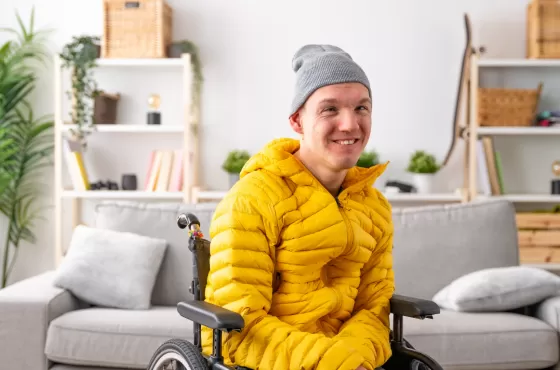SDA provides accessible and tailored homes for people with high levels or functional impairment or support needs. But is it right for you?
What exactly is Specialist Disability Accommodation?
Here are some of the defining features of Specialist Disability Accommodation.
Beyond ordinary housing
SDA homes go further than basic accessibility - it’s about being tailored to specific needs. With SDA, residents can enjoy independence and safety at home. Plus, the home environment is further enhanced by the integration of community supports.
Types of SDA
All types of dwellings - everything from stand-alone homes to small group apartments – can be SDA. It’s good to understand the different options and design approaches available. You might even be surprised by the range on offer!
Inclusions
SDA includes homes with high physical support, assistive technology, and even 24/7 staff support when needed through Supported Independent Living. Explore what sets SDA apart from other options. Does it suit your needs? Are you likely to be successful in applying for it? Ask yourself these questions to identify if SDA is right for you.
Do I qualify for NDIS Specialist Disability Accommodation?
To identify if you might qualify for SDA, consider the following…
NDIS eligibility
First, and most importantly, you must be an NDIS participant to be eligible to access SDA funding. If you are not already an NDIS participant, you can apply.
Already accessing the NDIS? Talk with your Support Coordinator, Psychosocial Recovery Coach, planner, or Local Area Coordinator (LAC). They’ll help you understand your options.
High support requirements
To get SDA, you need to demonstrate that it’s the most reasonable and necessary option for you. It’s important to show that your current living environment is unsuitable for your needs. Evidence from allied health professionals is a must, which leads us to…
Functional assessments
Allied health professionals use evidence-based methods to understand your support needs. This includes psychologists, occupational therapists, and physiotherapists. If they think SDA could be good for you, they can write a report that shows how SDA could support you better than other options.
SDA eligibility rules
With all that said, it’s best to seek clear explanations of the NDIS SDA rules. Ask an expert, such as your Support Coordinator, Psychosocial Recovery Coach, planner, or LAC.
Looking for a SIL provider you can depend on? Be supported in a family-style home by skilled support staff
The journey to getting SDA
Planning meeting
Start by expressing your interest in SDA with your Support Coordinator, Psychosocial Recovery Coach, planner, or LAC. They'll guide you through the eligibility assessment process.
SDA in your NDIS plan
If considered eligible, SDA funding gets included in your NDIS plan. In practice, this looks like money allocated for housing costs.
Searching for the right SDA
Explore providers with different designs, locations, and atmospheres. Look for indications that both the provider and the home fit with your lifestyle. Our advice? Don’t compromise on the things that are important for you.
Waitlists and availability
Ask trusted members of your support network about wait times for securing a place. Manage your expectations – it may take some time to find the best option.
Life in an SDA home
Take it from us: life in an SDA home can be pretty amazing. Here are some of the benefits.
Building independence
SDA designs allow for greater independence. Property features make tasks like bathing, dressing, and cooking much easier.
Community and connection
You’ll find that SDA promotes inclusion. Many properties allow easy access to nearby services and opportunities for making friends. With SDA, you’re empowered to lead your best life!
24/7 onsite support (if applicable)
When looking for SDA providers, consider if you need round-the-clock support. Prioritise providers who include the right level of support staff.
Costs beyond rent
This is an important one! Factor in other housing-related costs (like groceries and utilities) into your financial plan. These expenses are generally not covered by SDA funding.
Frequently asked questions about SDA
Lastly, we thought we’d answer some of the more common questions we get about SDA:
Can I share an SDA home?
Yes - subject to your NDIS plan and your funding! Or you can choose to live by yourself. However, many SDA designs do promote small group living. Good SDA toes the line of fostering both privacy and a sense of community.
Can I decorate my space?
Absolutely, but you should discuss this with your SDA and SIL providers first. Keep in mind that SDA must offer essential accessibility. So, any self-expression that doesn’t impact accessibility is encouraged.
Do I have a say in choosing my SDA provider?
You bet! The NDIS emphasises choice and control. You should do enough research to find a provider that aligns with your needs and lifestyle goals. If there was ever a time to be picky, this is it. Ask your Support Coordinator or family/guardians to help you look at options.
In summary…
If standard homes aren’t suitable for your needs, Specialist Disability Accommodation opens up a world of opportunity!
With careful planning and some shopping around, SDA can support you lead an independent and fulfilling life. If you or someone you know might benefit from SDA, it's east to start exploring. Contact your NDIS planner or visit the NDIS website for more information.
Moving out on your own, leaving the family home or moving in a share house is a big decision. If you have a question about Supported Independent Living or Specialist Disability Accommodation, you can call us on 8256 9800 or send us an email.
